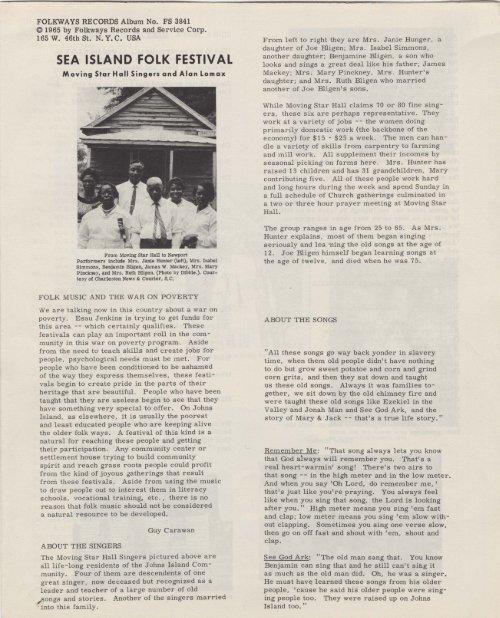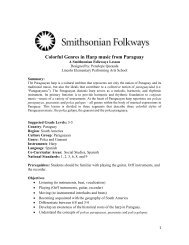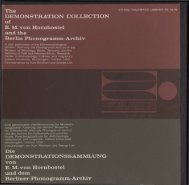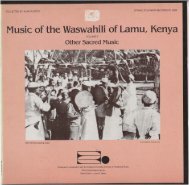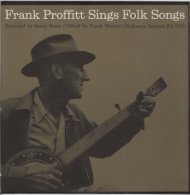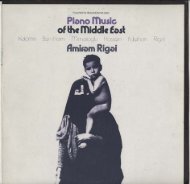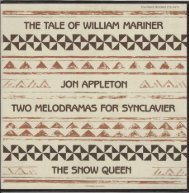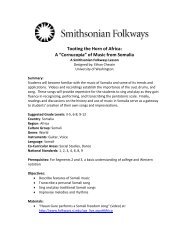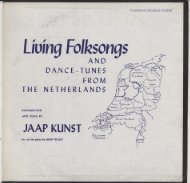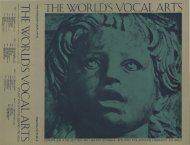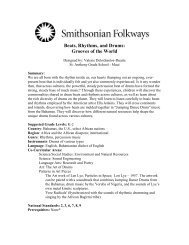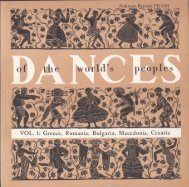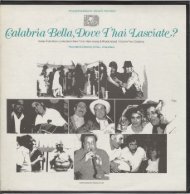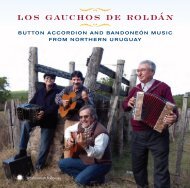Create successful ePaper yourself
Turn your PDF publications into a flip-book with our unique Google optimized e-Paper software.
FOLKWAYS RECORDS Album No. FS 3841<br />
© 1965 by Folkways Records and Service Corp.<br />
165 W. 46th St. N. Y. C. USA<br />
p<br />
SEA ISLAND FOLK FESTIVAL<br />
Moving Star Hall Singers and Alan Lomax<br />
From Moving star Hall to Newport<br />
Performers Include Mrs. Janie Hunter (left), Mrs. Isabel<br />
Simmons, Benjamin BUgen, James W. Mackey, Mrs. Mary<br />
Pinckney, and Mrs. Ruth BUgen. (Photo by Dibble.). Courtesyof<br />
Charleston News & Courier, S.C.<br />
FOLK MUSIC AND THE WAR ON POVERTY<br />
We are talking now in this country about a war on<br />
poverty. Esau Jenkins is trying to get funds for<br />
this area - - which certainly qualifies. Thes e<br />
<strong>festival</strong>s can play an important roll in the community<br />
in this war on poverty program. Aside<br />
from the need to teach skills and create jobs for<br />
people, psychological needs must be met. For<br />
people who have been conditioned to be ashamed<br />
of the way they express themselves, these <strong>festival</strong>s<br />
begin to create pride in the parts of their<br />
heritage that are beautiful. People who have been<br />
taught that they are useless begin to see that they<br />
have something very special to offer. On Johns<br />
Island, as elsewhere, it is usually the poorest<br />
and least educated people who are keeping alive<br />
the older <strong>folk</strong> ways. A <strong>festival</strong> of this kind is a<br />
natural for reaching these people and getting<br />
their participation. Any community center or<br />
settlement house trying to build community<br />
spirit and reach grass roots people could profit<br />
from the kind of joyous gatherings that result<br />
from these <strong>festival</strong>s. Aside from using the music<br />
to draw people out to interest them in literacy<br />
schools, vocational training, etc., there is no<br />
reason that <strong>folk</strong> music should not be considered<br />
a natural resource to be developed.<br />
ABOUT THE SINGERS<br />
Guy Carawan<br />
The Moving Star Hall Singers pictured above are<br />
all life-long residents of the Johns Island Community.<br />
Four of them are descendents of one<br />
great singer, now deceased but recognized as a<br />
leader and teacher of a large number of old<br />
,r.0ngs and stories. Another of the singers married<br />
, into this family.<br />
From left to right they are Mrs. Janie Hunger, a<br />
daughter of Joe Bligen; Mrs. Isabel Simmons,<br />
another daughter; Benjamine Bligen, a son who<br />
looks and sings a great deal like his father; James<br />
Mackey; Mrs. Mary Pinckney, Mrs. Hunter's<br />
daughter; and Mrs. Ruth Bligen who married<br />
another of Joe Bligen's sons.<br />
While Moving Star Hall claims 70 or 80 fine singers,<br />
these six are perhaps representative. They<br />
work at a variety of jobs - - the women doing<br />
primarily domestic work (the backbone of the<br />
economy) for $15 - $ 25 a week. The men can handIe<br />
a variety of skills from carpentry to farming<br />
and mill work. All supplement their incomes by<br />
<strong>sea</strong>sonal picking on farms here. Mrs. Hunter has<br />
raised 13 children and has 31 grandchildren, Mary<br />
contributing five. All of these people work hard<br />
and long hours during the week and spend Sunday in<br />
a full schedule of Church gatherings culminated in<br />
a two or three hour prayer meeting at Moving Star<br />
Hall.<br />
The group ranges in age from 25 to 65. As Mrs.<br />
Hunter explains, most of them began singing<br />
seriously and lea. 'ning the old songs at the age of<br />
12. Joe Bligen himself began learning songs at<br />
the age of twelve, and died when he was 75.<br />
ABOUT THE SONGS<br />
"All these songs go way back yonder in slavery<br />
time, when them old people didn't have nothing<br />
to do but grow sweet potatoe and corn and grind<br />
corn grits, and then they sat down and taught<br />
us these old songs. Always it was families together,<br />
we sit down by the old chimney fire and<br />
were taught these old songs like Ezekiel in the<br />
Valley and Jonah Man and See God Ark, and the<br />
story of Mary & Jack -- that's a true life story."<br />
Remember Me: "That song always lets you know<br />
that God always will remember you. That's a<br />
real heart-warmin' song! There's two airs to<br />
that song - - in the high meter and in the low meter.<br />
And when you say 'Oh Lord, do remember me, '<br />
that's just like you're praying. You always feel<br />
like when you sing that song, the Lord is looking<br />
after you." High meter means you sing' em fast<br />
and clap; low meter means you sing 'em slow without<br />
clapping. Sometimes you sing one verse slow,<br />
then go on off fast and shout with' em, shout and<br />
clap.<br />
See God Ark: "The old man sang that. You know<br />
Benjamin can Sing that and he still can't sing it<br />
as much as the old man did. Oh, he was a singer.<br />
He must havEl learned these songs from his older<br />
people, 'cause he said his older people were Singing<br />
people too. They were raised up on Johns<br />
Island too. "


